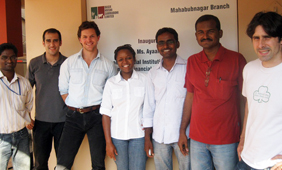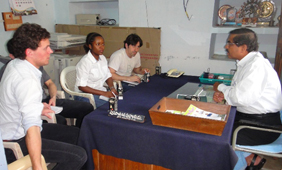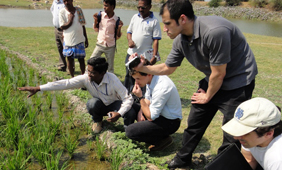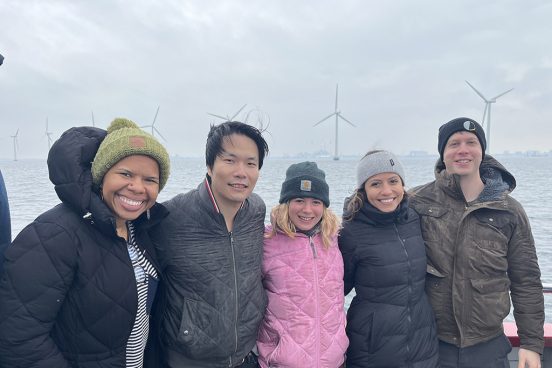Duke Daytime MBA Student Blog

The Indian Job
 Since setting foot on campus in early August of last year, we’ve consistently been reminded that part of what distinguishes Fuqua’s student body from that of other business schools is that we’re selected on the belief that we can all be global “leaders of consequence.” During the trials and recurring minutiae of the fall terms, it was hard not to see this as a cross between creative wordplay and marketing rhetoric. However, the Global Consulting Practicum in Social Entrepreneurship, one of Fuqua’s enduring international programs, showed this term to be somewhat more meaningful.
Since setting foot on campus in early August of last year, we’ve consistently been reminded that part of what distinguishes Fuqua’s student body from that of other business schools is that we’re selected on the belief that we can all be global “leaders of consequence.” During the trials and recurring minutiae of the fall terms, it was hard not to see this as a cross between creative wordplay and marketing rhetoric. However, the Global Consulting Practicum in Social Entrepreneurship, one of Fuqua’s enduring international programs, showed this term to be somewhat more meaningful.
 For months leading up to spring break, my team had been working with a major microfinance company in Andhra Pradesh, which was hoping to increase its social impact by extending agricultural services to farmers in the area. We collaborated with our counterparts in Hyderabad at unusual hours, working around the constraints of our other classes, and around our general lack of knowledge about agriculture. Finally for spring break, we traveled to India to meet with the company representatives and continue our work. Upon arriving in Hyderabad, we found some finer aspects of doing business in a developing country.
For months leading up to spring break, my team had been working with a major microfinance company in Andhra Pradesh, which was hoping to increase its social impact by extending agricultural services to farmers in the area. We collaborated with our counterparts in Hyderabad at unusual hours, working around the constraints of our other classes, and around our general lack of knowledge about agriculture. Finally for spring break, we traveled to India to meet with the company representatives and continue our work. Upon arriving in Hyderabad, we found some finer aspects of doing business in a developing country.
 During our first week, in an effort to understand the challenges facing our partner organization, we spent some time with the farmers. As someone who’d never even been on a farm in the United States, this was something of an awakening. This certainly exhibited poverty beyond anything I could have conceived from a sheltered American perspective. However, amid this pervasive suffering, there was an encouraging sense of optimism that with the right help, from the right partner, that perhaps future generations in their villages might live better. We felt privileged to be able to apply the skills we’d learned in our jobs and in business school to be able to help these folks, however incrementally, and I think that was partially due to their very obvious gratitude.
During our first week, in an effort to understand the challenges facing our partner organization, we spent some time with the farmers. As someone who’d never even been on a farm in the United States, this was something of an awakening. This certainly exhibited poverty beyond anything I could have conceived from a sheltered American perspective. However, amid this pervasive suffering, there was an encouraging sense of optimism that with the right help, from the right partner, that perhaps future generations in their villages might live better. We felt privileged to be able to apply the skills we’d learned in our jobs and in business school to be able to help these folks, however incrementally, and I think that was partially due to their very obvious gratitude.
Our second week involved attempting to help our client convert government infrastructure, currently in disrepair, for private use. The level of red tape inherent in dealing with the many levels and departments of the Indian public sector created significant hurdles to making this happen. This may have been an endemic problem, as much of the accountability we, in America, have come to expect from our officials was absent in India. Attempting to overcome this took some creativity and some flexibility. As in all matters of consulting, the client’s goals, no matter how challenging or unattainable they may appear, are of paramount of importance. Reconciling what the client thought was best, with what we thought was best, might have been the biggest challenge, even considering the numerous obstacles that have made India a questionable investment for Western firms despite its 10% growth rate. In the end, we were successfully able to recommend a workable plan of action for our client, though, with six weeks left in the term, our work isn’t done yet.
A day-long odyssey of a trip home, combined with a business school line of thinking, has a way of causing a person to try to summarize the key takeaways from a trip so monumental as this one. For me, the teamwork aspect of our project was probably most interesting. Yes, I’m fully cognizant that we get a healthy dose of teamwork in our courses and in extra-curricular tasks, but there was something about bonding amid farmers and Indian government officials that made cohesion even more important, especially when our presentation got moved up a day without much forewarning. Additionally, being able to use business skills in service of the bottom of the figurative pyramid was, with all due respect to my various former employers, something of a new experience for me. Perhaps my cynicism has been washed aside in my time at Fuqua, but when I was hunched behind my computer poring over financial spreadsheets as I had done so many times before, all the pretense seemed to have vanished, and it all seemed to be that much more meaningful and enduring for me.



